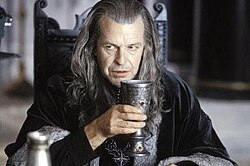Denethor
| Template:Tolkienchar |
Denethor II is a fictional character in J. R. R. Tolkien's The Return of the King, which is the third and final part of his novel The Lord of the Rings. In the novel, he is the 26th and last ruling Steward of Gondor.
Appearances
Literature
As stated in the early chapters and the Appendices of The Return of the King, Denethor, son of Ecthelion II, was widely considered a man of great will, foresight, and strength. However, he failed to reach out to his people, who flocked instead to Thorongil, an outsider who served Denethor's father with great renown. Thorongil vanished from Gondor four years before Denethor would succeed his father as Ruling Steward. Thorongil (who was secretly Aragorn, Chieftain of the Dúnedain of the North and hence a claimant to Gondor's throne) had advised Ecthelion to put faith in the wizard Gandalf, whom Denethor distrusted.
He married Finduilas, daughter of Prince Adrahil of Dol Amroth. She gave birth to two sons: Boromir and Faramir, before dying young. Denethor never remarried after his wife's death, and became more grim and silent than before.
Unlike Saruman, Denethor was too strong to be corrupted by Sauron's lies. In the novel, he began secretly using a palantír to probe Sauron's strength, though he incorrectly insisted he was able to control it. The effort aged him quickly, and the knowledge of Sauron's overwhelming force depressed him greatly, mostly due to deliberately biased visions from the palantír on the part of Sauron. Boromir's death depressed Denethor further, and he became ever more grim. Nonetheless he continued to fight Sauron with every resource at his disposal until the forces of Mordor arrived at the gates of the White City, at which point he lost all hope.
Near the novel's climactic battle, Denethor ordered the warning beacons of Gondor to be lit, and forces were called in from all of Gondor's provinces. The civilian population of Minas Tirith was sent away to safety. As invasion seemed imminent, Denethor sent the Red Arrow to the Rohirrim. The Council decided that Gondor could make no stroke of its own but Denethor ordered Gondor's forces to the outer defences of Osgiliath and the great wall of the Rammas Echor. He wanted to make a stand, since the defences had been built at great expense and not yet been overrun. His son Faramir and the other commanders objected due to the Enemy's overwhelming numbers and preferred instead to defend the city itself, but Faramir nonetheless obeyed out of respect for his father and late brother. Faramir's body, apparently mortally wounded, was returned during the retreat, as the capital city was under siege by vastly superior forces.
This last loss finally broke Denethor's spirit. Denethor committed suicide, having ordered his men to burn him alive on a pyre prepared for himself and Faramir. He took the white rod of his office and broke it over his knee, casting the pieces into the flames. He laid himself down on the pyre and so died, clasping the palantír in his hands. He also attempted to take the grievously injured and apparently dying Faramir with him, but was thwarted by the timely intervention of Peregrin Took, with help from Gandalf and the guard Beregond.
The Stewardship passed to Faramir, who remained in the Houses of Healing for a time and was later made Prince of Ithilien by Aragorn.
Adaptations
Denethor was voiced by William Conrad in Rankin/Bass's 1980 animated adaptation of The Return of the King, and by Peter Vaughan in BBC Radio's 1981 serialization.

In Peter Jackson's live-action movie trilogy, Denethor was played by John Noble. He first appears in a deleted scene in The Lord of the Rings: The Two Towers, but does not have a major role until the next movie. In The Lord of the Rings: The Return of the King, his role is substantially different from the novel; the DVD commentary describes Denethor as a sort of Shakespearean tragic character. He refuses to light the beacons of Gondor to call for the aid of Rohan (Gandalf has to send Pippin to light the city's beacon). He openly favours his dead son Boromir, and sends his remaining son Faramir and all of his cavalry on a suicidal mission to enemy-captured Osgiliath, whereas in the novel, this mission though objected does have some military sense. He calls for the city's defenders to flee when he sees Sauron's army, but Gandalf incapacitates him and takes command of the defence. Denethor is also shown as self-indulgent, eating and drinking gluttonously while listening to Pippin's songs as the besiegers approach the city, whereas in the book he is sternly ascetic in his habits, wearing armour and a sword day and night.
Later, when attempting to burn himself to death on his son Faramir's (premature) funeral pyre in what seems to have been a fit of insanity, Denethor is set ablaze when Gandalf and Pippin rescue Faramir, who is still alive. At this point Denethor realizes what he has done and is sad as he looks at Faramir. Consumed in flame and regret, Denethor runs from the pyre chamber and hurls himself from the top of Minas Tirith. In the extended edition of the film, after Denethor's death, Aragorn is seen using a palantír next to his throne. The film only hints at Denethor's use of the palantír which drives him mad, information revealed in the Pyre scene, which is more violent than the book. Jackson also has Denethor jump off the Citadel in addition to burning himself on the Pyre, one of the earliest changes.[1]
References
- ^ Sibley, Brian (2006). Peter Jackson: A Film-maker's Journey. London: HarperCollins. p. 345. ISBN 0-00-717558-2.
- Tolkien, J. R. R. (1955). The Return of the King. The Lord of the Rings. Boston: Houghton Mifflin. OCLC 519647821.
See also
External links
- Denethor at The Thain's Book
| Preceded by Ecthelion II |
Stewards of Gondor | Succeeded by Faramir |

